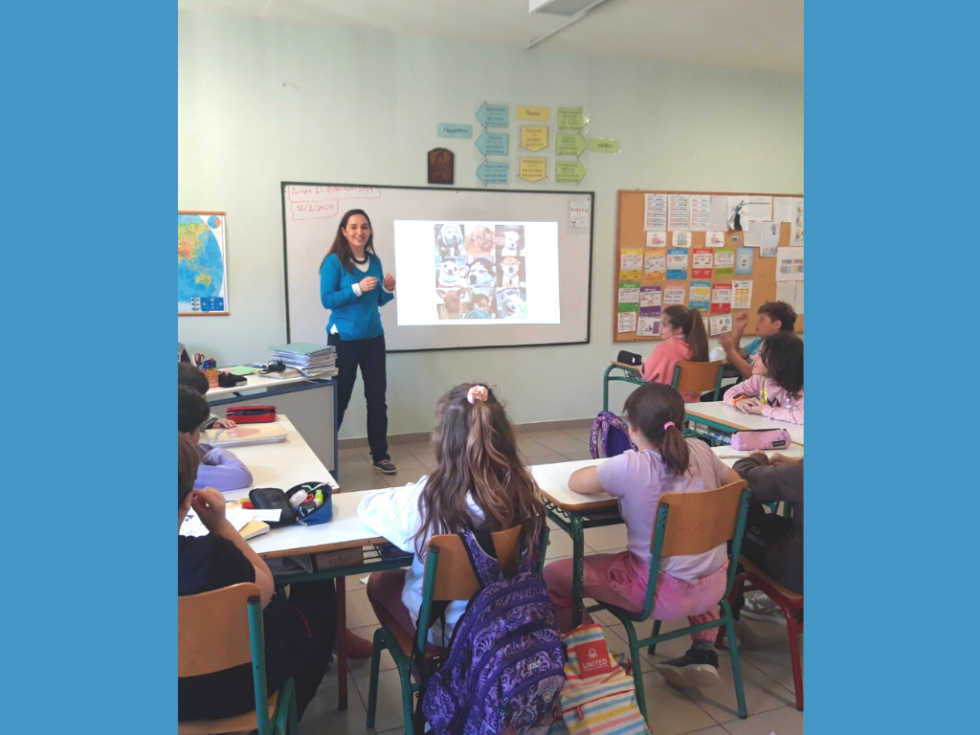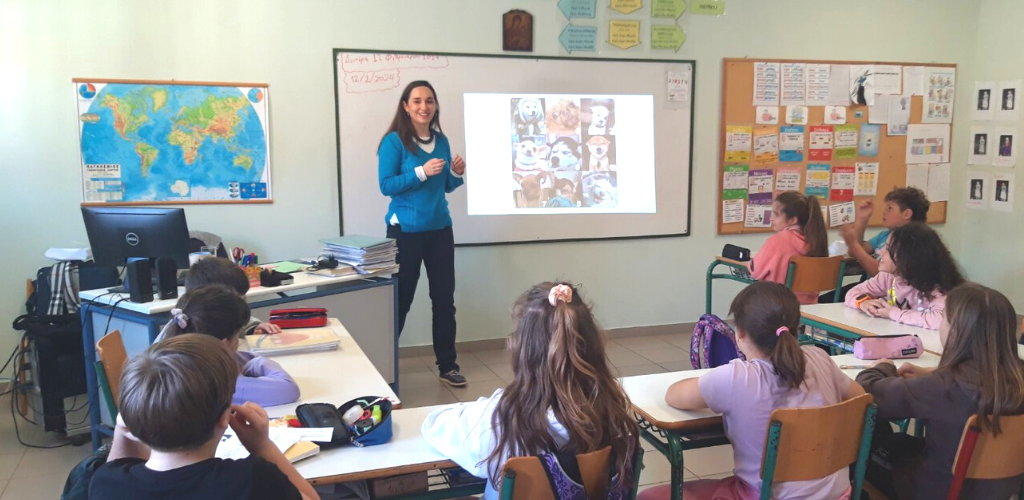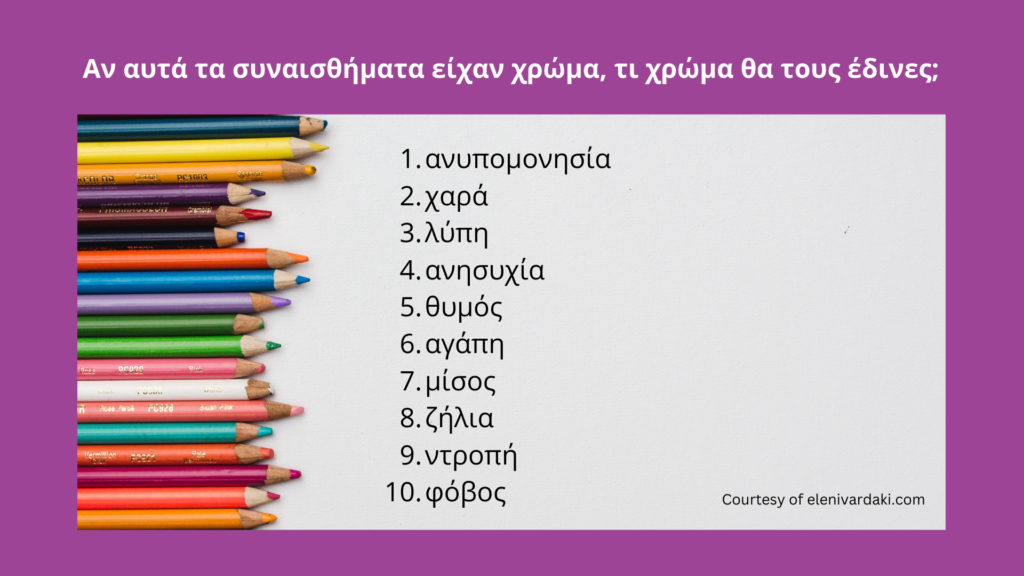
Effects of Social Emotional Learning And EFT
WHAT’S THE ISSUE: While children are often very mindful, feeling their negative emotions intensely, they don’t always have the self-regulation tools to help themselves feel better. On February 12th 2024, I had the pleasure of delivering an introduction to EFT Tapping for children lesson in the innovative Primary School of Kala Nera, Mt. Pelion. The lesson was delivered in Greek. It was called Emotions and Friendship (Συναισθήματα και Φιλία). In this article, I walk you through how I structured this lesson, and what effects the Social Emotional Learning activities had on the children who chose to participate.
I’d like to thank the School Principal, Mrs Aspasia Koltisdopoulou, and the classroom teacher, Mrs Filitsa Mourzopoulou, for inviting me into their school and classroom to deliver this SEL lesson to their 4th Grade students.
LESSON DESIGN WORK
COLLABORATING WITH THE CLASSROOM TEACHER TO MEET STUDENT NEEDS
Before designing this bespoke Social Emotional Learning lesson, I spoke with their lovely classroom teacher, Mrs. Mourtzopoulou, to find out what the needs of the class were. Since they are an academically strong group with good academic self-esteem, we decided to focus the SEL lesson on emotions and friendships. There were no bullying issues, just hurt feelings caused by misunderstandings.
Misunderstandings can happen in friendships. And while the school teachers work hard to help children resolve conflicts, the children didn’t have a regulation tool to help themselves release hurt feelings so they can be OK, emotionally. That’s where introducing the children to tapping came in.
HOW I STRUCTURED THIS SEL LESSON
Here is how I structured a bespoke 30 minute Social Emotional Learning lesson designed to help the children in this class process any friendship-related hurt feelings they had so that they can feel okay.
ON THE DAY: INVITING STUDENTS WHO FELT READY TO PARTICIPATE
After introducing myself, I made it clear that all of the activities we were going to do in this lesson were simply invitations. No one was required to take part in any of the activities if they did not feel ready to do so.
As educators, we don’t force or coerce anyone who isn’t ready to work on their emotional intelligence to engage in a social or emotional learning activity. It’s up to them to ‘opt-in’ and have a go. It’s their choice.
1. FINGER TAPPING FOR REGROUPING, FOCUSING, AND BUILDING RAPPORT

The first activity was a simple finger tapping exercise, or as ‘secret tapping’, as registered Psychologist Dr. Margaret Lambert calls it when she introduces it to primary school children in Australia. It’s one of the SET (Simple Energy Techniques) that are under the umbrella of Emotional Freedom Techniques, and is easy to apply in school settings for a range of needs. It’s benefits range from helping children feel calmer and more focused so that they can regroup and learn better in class, to helping children better manage performance anxiety such as test anxiety.
The version of the SET tapping technique that I introduced to this class was designed by Peak Performance coach, Steve Wells, in conjunction with Dr David Lake. Steve Wells demonstrates how to do this finger tapping exercise about 6 minutes in to the educational video below.
The way I adapted it to the classroom setting is I made it a game. I told the children that instead of using my voice to tell them it was time to stop talking and regroup to do a whole class discussion after each activity – I would just tap through my finger tips. When they saw me doing that, it was the signal for them to stop what they were doing, stop talking, and do the same on their finger tips.
Interestingly in this class, a couple of children joined in the first time. Whereas the second time, most of the children noticed and joined in. By the second attempt, it was clear that the ones who chose to take part were more alert and focused. Two of them were even smiling – clearly enjoying the game aspect of this regrouping activity! And a sign that their nervous system was calm so that their Social Engagement System could switch on, which helps children focus and learn better.
The inspiration for this school-appropriate application of tapping in the classroom came from an interview I’d done with fellow EFT Practitioner, Kathleen Weber, back in 2022. At the time, Kathleen was working as a School Counselor. In this video, she talks about this application of tapping in the classroom (see 4-6 minutes).
2. LEARNING ABOUT EMOTIONS
I then led them through a series of activities for building emotional awareness and literacy. First, we did an emotional check-in where they identified which of the 9 ‘dog feelings’ best represented what they were feeling, in that moment.

Next, I led them through two emotional literacy activities to help build their emotional vocabulary and scaffold their learning in preparation for the final exercise. The first activity was to discuss, in pairs, what color they would give each of these emotions, before doing some finger tapping to regroup and discuss as a class. Then we went through each of these 10 emotions and categorized them as negative, positive, or both (‘it depends’).

3. CONNECTING WITH FRIENDSHIP PROBLEMS: FROM GENERAL TO SPECIFIC
Next, I asked them to take 3-4 minutes to discuss, in pairs, all the ways something could go wrong in a friendship that could leave a child feeling one or more of the difficult emotions. We then did a second round of finger tapping to regroup and share examples of what could go wrong in a friendship, in general, as a class.
I then asked them to choose a specific, recent event or memory to do with a friendship going wrong. It could be something that happened to them in the last week, or something that happened that morning during break or recess. It could be something someone said, or something someone didn’t say. Something someone did, or something someone didn’t do. It might be something that happened in school, or out of school. Or something they saw on social media.
The important thing was that it was recent, and that when they brought it to mind, they still felt a negative emotion, in the present moment, in the 4/10-7/10 range. All I wanted them to write down was one word – the negative emotion they felt when they thought about what had happened. And then to write how intensely they felt that emotion on a scale of 0-10 when they thought about what had happened.

For most of the children, the emotion that bothered them the most was either anger or sadness. A number reported felt their anger or sadness like an 8, 9, or 10 in intensity (10 being the most intense it could possibly be). The lowest was a child who felt a 6/10 in intensity when thinking about an event that still brought up a difficult emotion.
Next, I led them through a basic group tapping exercises, just two rounds of tapping. As we tapped, and I invited anyone who wanted to to shout out the emotion they were feeling, one of the children reported feeling ‘tremendous anger’ in that moment. They got to acknowledge their true feelings, in a safe space, and do something constructive about it.
SO what WERE the RESULTS?
Almost immediate relief! After only two rounds of tapping, the child who before tapping was experiencing a negative emotion around a friendship issue in the 6/10 level of intensity had experienced a shift down to 3/10.
Remarkably, all the children who had started off on a 8, 9, or a 10 before doing EFT Tapping, the intensity of their negative emotion dropped to a 0 or a 1…including the one who had started off with ‘tremendous anger’! It’s worth highlighting that this effect occurred after just TWO rounds of group tapping.
Now, one child who had started out feeling 10/10 anger did still feel a 10/10 angry after we did two rounds of tapping. This is understandable; we never expect 100% effectiveness from any lesson. Some difficulties are beyond the scope of an educational whole group intervention.
I explained to the child that there’s usually a good reason why we get stuck in a big emotion. His teacher also confirmed that she was aware of the child’s problem, and the school was already looking into ways of helping the child.
When the School Principal came by after the lesson to ask how it went as the children headed out the door, one happily replied – ‘Perfect!’
From my perspective as an educator and EFT Practitioner, I was amazed to witness, first hand, just how powerful group tapping can be when delivered in a school setting via a structured social emotional learning lesson.
I’ve worked with primary school children of all ages via Zoom as an EFT Practitioner. And so I knew, from my 1:1 therapeutic coaching work, that emotions tend to shift a LOT quicker with the little ones compared with teenagers and adults. But it’s another thing to see it panning out in a classroom setting for so many children…at the same time.
Imagine how much easier teachers’ and school psychologists’ lives would be if more knew about these cutting edge Social Emotional Learning exercises for kids…!
Aremu, A. O., & Taiwo, A. K. (2014). “Reducing Mathematics Anxiety Among Students with Pseudo-Dyscalculia in Ibadan through Numerical Cognition and Emotional Freedom Techniques: Moderating Effect of Mathematics Efficacy.” African Journal for the Psychological Studies of Social Issues, 17(1), 113–129.
Gaesser, A. H., & Karan, O. C. (2017). “A Randomized Controlled Comparison of Emotional Freedom Technique and Cognitive-Behavioral Therapy to Reduce Adolescent Anxiety: A Pilot Study.” Journal of Alternative and Complementary Medicine, 23(2), 102-108. Randomized Controlled Clinical Trial. Doi:10.1089/acm.2015.0316
Gaesser, A. H. (2014). “Interventions to Reduce Anxiety for Gifted Children and Adolescents.” Doctoral Dissertations, 377. Randomized Controlled Clinical Trial. http://digitalcommons.uconn.edu/dissertations/377
Jain, S., & Rubino, A. (2012). “The Effectiveness of Emotional Freedom Techniques (EFT) for Optimal Test Performance: A Randomized Controlled Trial.” Energy Psychology: Theory, Research, & Treatment, 4(2), 13-24. Randomized Controlled Clinical Trial. Doi:10.9769.EPJ. 2012.4.2.SJ
Lambert, M. T., Smith, S. E.; Moss, S., Kirshbaum, M. N. (2022) “Emotional Freedom Techniques (Tapping) to Improve Wellbeing and Reduce Anxiety in Primary Classrooms”, Australian Journal of Teacher Education, 7 (3). https://ro.ecu.edu.au/ajte/vol47/iss3/5/
Sezgin, N., & Özcan, B. (2009). “The Effect of Progressive Muscular Relaxation and Emotional Freedom Techniques on Test Anxiety in High School Students: A Randomized Controlled Trial.” Energy Psychology: Theory, Research, and Treatment, 1(1), 23-30. Randomized Controlled Clinical Trial.
Sezgin, N., Ozcan, B., Church, D., (2009). “The Effect of Two Psychophysiological Techniques (Progressive Muscular Relaxation and Emotional Freedom Techniques) On Test Anxiety in High School Students: A Randomized Blind Controlled Study.” International Journal of Healing and Caring, 9(1). Randomized Controlled Clinical Trial.
Stapleton, P., Mackay, E., Chatwin, H., Murphy, D., Porter, B., Thibault, S. Pidgeon, A. (2017). “Effectiveness of a School-based Emotional Freedom Techniques Intervention for Promoting Student Wellbeing.” Adolescent Psychiatry, 7(2), 112-126. Randomized Controlled Clinical Trial.
Benor, D. J., Ledger, K., Toussaint, L., Hett, G., & Zaccaro, D. (2009). “Pilot study of Emotional Freedom Technique (EFT), Wholistic Hybrid derived from EMDR and EFT (WHEE) and Cognitive Behavioral Therapy (CBT) for treatment of test anxiety in university students” Explore, 5(6). Randomized Controlled Clinical Trial.
Boath, E., Stewart, A., Carryer, A. (2011). “Tapping for Success: A Pilot Study to Explore if Emotional Freedom Techniques (EFT) Can Reduce Anxiety and Enhance Academic Performance in University Students.” Innovative Practice in Higher Education, 1(3).
Boath, E. Stewart, A. Carryer, A. (2013). “Is Emotional Freedom Techniques (EFT) Generalizable? Comparing Effects in Sport Science Students Versus Complementary Therapy Students.” Energy Psychology Journal, 5(2). Doi: 10.9769.EPJ.2013.5.2.EB.AC.AS.SU
Boath E., Good R., Tsaroucha A., Stward T., Pitch Sh., & Boughey A. (2017) “Tapping Your Way to Success: Using Emotional Freedom Techniques (EFT) to Reduce Anxiety and Improve Communication Skills in Social Work Students”, Social Work Education: The International Journal, 715-730, Doi:10.1080/02615479.2017.1297394
Dincer B, Özçelik SK, Özer Z, Bahçecik N. (2022) “Breathing Therapy and Emotional Freedom Techniques on Public Speaking Anxiety in Turkish Nursing Students: A Randomized Controlled Study. Explore (NY). 18(2), 226-233. Doi:10.1016/j.explore.2020.11.006.
Nenden LW, Tukimin S., Dwiagung R., Agus S. (2022) “The Effectiveness of Emotional Freedom Technique on Public Speaking Anxiety in University Students: An Integrated Review”, Open Access Macedonian Journal of Medical Sciences, 10(F):263-268 Doi:10.3889/oamjms.2022.7919
Patterson SL. (2016) “The Effect of Emotional Freedom Technique on Stress and Anxiety in Nursing Students: A Pilot Study”, Nurse Education Today, 40:104-10. Doi: 10.1016/j.nedt.2016.02.003.
Rogers R, Sears SR. (2015) “Emotional Freedom Techniques for Stress in Students: A Randomized Controlled Dismantling Study.” Energy Psychology Theory Res Treatment, 7:26–32. Doi:10.9769/EPJ.2015.11.1.RR
Bach, et al (2019), “Clinical EFT (Emotional Freedom Techniques) Improves Multiple Physiological Markers of Health”, Journal of Evidence-Based Integrative Medicine, Vol 24.
Church, et al (2012) “The Effect of Emotional Freedom Techniques on
Stress Biochemistry: A Randomized Controlled Trial”, The Journal of Nervous and Mental Disease, Vol 200.
Dawson, et al (2018), “Is Tapping on Acupuncture Points an Active Ingredient in Emotional Freedom Techniques? A Systematic Review and Meta-analysis of Comparative Studies”, The Journal of Nervous and Mental Disease, Vol 206.
Stapleton, et al (2020) “Reexamining the Effect of Emotional Freedom
Techniques on Stress Biochemistry: A Randomized Controlled Trial”, Psychological Trauma: Theory, Research, Practice, and Policy.
Maharaj, M. (2016) “Differential Gene Expression after Emotional
Freedom Techniques (EFT) Treatment: A Novel Pilot Protocol for Salivary mRNA Assessment”, Energy Psychology, Vol 8.
Church, et al (2018) “Epigenetic Effects of PTSD Remediation in Veterans using Clinical Emotional Freedom Techniques: A Randomized Controlled Pilot Study”, American Journal of Health Promotion, Vol 32.
Stapleton, et al (2018) “An Initial Investigation of Neural Changes in Overweight Adults with Food Cravings after Emotional Freedom Techniques”, OBM Integrative and Complementary Medicine Journal, Vol 3.
Stapleton, et al (2022) “Neural changes after Emotional Freedom Techniques treatment for chronic pain sufferers”, Journal of Complementary Therapies in Clinical Practice, Vol 49.
Wittfoth, et al (2022) “Bifocal Emotion Regulation Through Acupoint Tapping in Fear of Flying”, Journal of NeuroImage: Clinical, Vol 34 .
Wittfoth, et al (2020) “Emotion Regulation through Bifocal Processing of Fear Inducing and Disgust Inducing Stimuli”, BMC Neuroscience Journal, Vol 21.
Stapleton, P. (2019) The Science Behind EFT: A Proven Stress Management Technique for Mind and Body.
Stapleton, P. (2023) Memory Improvement Through EFT Tapping: A Way to Boost Recall and Clarity.
Learn More
ABOUT THE AUTHOR

Eleni Vardaki is an experienced teacher and EFT Tapping Coach who specialises in stress, anxiety, and academic success. She works with school and university level students who want her assistance on clearing their inner blocks to achieving their personal, career-related, or academic goals. She also leads online and in-person group sessions for staff, parent, and student well-being.



